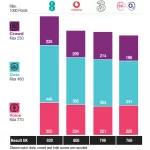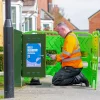Global Broadband Lines Top 1.42 Billion as UK FTTP Take-up Stalls

The latest research from Point Topic has revealed that world fixed broadband lines grew by 1.6% (22.39 million) in Q3 2023 to total 1.42 billion connections, which compares with 1.87% (24.59m) in the same quarter last year. But the subscriber growth rate of “full fibre” (FTTP/B) networks in the UK almost stalled in the latest quarter.
As usual, East Asia continued to dominate in Q3 2023, maintaining its position as the largest market with a 49.96% share of global fixed broadband subscribers, up from 49.62% in Q2 2023 – this is mainly due to China’s market size. In fact, in terms of technology, China alone added 13 million new FTTP/B lines during the quarter. By comparison, the whole of Europe (inc. UK) accounted for just 3.85% of net adds in the last quarter.
Speaking of broadband technologies, between Q2 2023 and Q3 2023, the share of FTTH/B connections in the total fixed broadband subscriptions went up by 0.62% and now accounts for 68.3%. The growth in full fibre take-up is naturally continuing to be fuelled by a decline in older copper-based DSL / ADSL broadband (down by 0.29% in Q3 to total 7.19%) lines and hybrid-fibre (FTTC/VDSL2) services (down by 0.16% to total 6.96%).
Advertisement
Similarly, cable (hybrid fibre coax) broadband connections, such as those delivered by many of Virgin Media’s lines in the UK, also declined by 0.14% in the quarter to account for 15.26% of the global market. By comparison, wireless and satellite based connections hardly figured into the table and remain largely stagnant.
However, it’s interesting to take a country-specific look at the quarterly growth of FTTP/B subscribers in Q3 2023, since the United Kingdom continues to be nowhere near the top list. Back in late 2021, and through much of 2022, it wasn’t uncommon to see the UK reporting a quarterly growth rate for related subscribers of between 12-13%. By comparison, Point Topic has informed ISPreview that the UK’s growth rate fell to 1.5% in Q3 2023, which is down sharply from 9.2% in Q2 and puts us well outside the top 10.
Top 10 Markets by FTTH/B Growth Rates
(countries with at least 0.5m fibre broadband subscribers)
| Country | FTTH/B subscriber growth, Q3 2023 |
| Algeria | 21.80% |
| Peru | 15.30% |
| Pakistan | 12.30% |
| Colombia | 9.30% |
| Paraguay | 9.10% |
| Israel | 8.80% |
| Costa Rica | 7.70% |
| Ireland | 7.50% |
| Kenya | 7.10% |
| Turkey | 6.40% |
According to Point Topic, FTTP and gigabit supply numbers are growing in the UK, but not as fast as people are dumping DSL/FTTC. Some future restatements may even this out a bit, but the belief is that some of those dumping older fixed lines have instead been switching to mobile broadband (4G/5G) connections, particularly those moving away from ancient DSL technologies or with lower bandwidth requirements.
Advertisement
Point Topic’s report doesn’t really deal with mobile connectivity, but there are certainly indications that people in many poorly served (fixed line) areas are starting to see local mobile connectivity improve at a faster rate and so making the jump. Quite how big the impact of this will be is still unclear, but suffice to say that fixed line operators aren’t only competing with each other, but also mobile.
Mark is a professional technology writer, IT consultant and computer engineer from Dorset (England), he also founded ISPreview in 1999 and enjoys analysing the latest telecoms and broadband developments. Find me on X (Twitter), Mastodon, Facebook, BlueSky, Threads.net and Linkedin.
« AltNet Broadband ISP Voneus Boosted by Extra £25m Investment
Shell Energy UK Confirms UK Broadband and Phone Price Hikes »























































“subscriber growth rate of “full fibre” (FTTP/B) networks in the UK almost stalled in the latest quarter”
Just goes to prove the UK isn’t really ready for FTTP yet, most households simply don’t need it yet and aren’t willing to pay for it yet.
This is the main reason why the Altnets are struggling, take-up rates are so low.
But if I switched from FTTC to FTTP (if it’s ever available, one day) with A&A, I’ll actually pay £8/month less for a faster service!
All the FTTP services that I’m aware of are cheaper than Virgin and BT for the same speeds and often still cheaper for faster speeds. So it doesn’t really make sense what you just said.
Or the years of ISPs being allowed to brand slow copper products as superfast fibre have left people confused as to what the difference is and less compelled to upgrade or switch.
If there is Openreach FTTP available where you live, and you want to change to a different supplier, it is difficult to get anything different by all accounts if you go on their website as that is all they offer you. The only way you can get FTTC if FTTP is available to you is to phone them, and then you get the sales blurb of why you should have FTTP. I know that from someone I chat to online that had that problem. in the end they went to Now broadband, since FTTC is all they do.
Even for people who are coming out of their contract and want to do a new contract, they are getting nagged to take FTTP. From what he told me, even price comparison sites give FTTP as the only choice.
As for price, for the same speed it is the price, so a 36 Mb/s FTTP is the same price as 36Mb/s FTTC for a lot of the providers, the problem is, some don’t do 36Mb/s on FTTP and the first speed is about 74Mb/s at a higher price.
Plusnet does a 74Mb/s for around £25 a month, so not bad a price, but no phone and 24-month contract where prices will increase and these are some of the reasons this person did not want to go with FTTP, also he doesn’t see what he should put up with the hassle of having it installed, holes drilled though wall, a box stuck on the indie wall for something he feels he doesn’t need. Also, the no doubt the upselling of trying to get him to go faster.
I can understand where he is coming from, I was happy to stay as I was.
@A Stevens, A&A is a bit of a strange beast, they are expensive anyway, certainly for what they offer, the reason why you would pay £8 less for FTTP is because openreach charges the provider less, but FTTp and still 1TB limit, as I have said before, 1TB is nothing in this day and age.
but if you are happy to pay the price then that is fine, maybe you think you are paying for a more reliable service or a better customer service. I have seen on a couple of forums that A&A have been having a few problems of late.
BT FTTP is almost as cheap as FTTC
The original comment is one of the most ridiculous things I’ve read.
“This is the main reason why the Altnets are struggling, take-up rates are so low.”
When they bother to even pass you. Toob did about 30 houses a mile from me last week – nothing here – No one is coming here so there is no choice let alone slow takeup!
I’ll gladly switch as soon as it ever reaches us. We’re in a fibre dead spot, despite being just 1.5 miles from a city centre, with all the surrounding exchanges nearly covered now…
How do other countries cope with competition/overbuild? Are they state monopolies, incumbents, free for alls?
How is the measurement made in an area of over build? Percentage of the properties using FTTP or as a percentage of each operators RFS lines? The latter would obviously reduce the uptake figure.
Do wonder whether an Offcom postcode auction of 3-4 year exclusively rights for fibre install would have encouraged more wide spread coverage faster but not prevented future competition.
Various different methods you would expect depending on the nature of the politics of the country. I doubt many have gone for the total free-for-all that this country has adopted though. Perhaps they would have been better off if they had started with areas that were most poorly served by existing technologies to obtain a better take up rate. It is absolutely ridiculous that some areas have 5 choices of infrastructure provider while some places are still struggling with poor ADSL. It has taken Openreach 2.5 years to get to 43% take up of FTTP despite them being the only provider (Swish have been building in the last year but their progress in glacial). Our VDSL service is very good so as Netflix works most people ain’t that bothered.
In my view all future FTTH builds should be wholesale only, like Openreach and CityFibre. Overbuilding would then become unattractive unless a new network offers sufficient benefits over an existing one. This would also make it easier for customers to switch ISPs, as the same ONT would be used.
All the big ISPs come out with their inflation busting price rises in Q1/Q2 therefore could the low Q3 growth be because people are far less likely to shopping around for new deals by then? With 12/24 month contracts being the norm it seems logical to me growth would be seasonal.
It is possible the swich to digital phones may drive up take up as it forces people to act and ISP’s f they have any sense will be pushing people to go to FTTH broadband rather than just have a digital phone. There is the risk that some may go the other way and ditch their landline
Digital voice have nothing to do with FTTP, my next door neighbour is on digital voice, and is on FTTC, being on digital voice will not make her chance to FTTP.
I don’t why some people on here are so worried about people still using FTTC, at the end of the day it is up to the individual.
“at the end of the day it is up to the individual.”
Until it isn’t, at which point the choice is to either accept it or find a solution that doesn’t involve the horror of having a small hole drilled in a wall.
@Chris W, eventually the majority of people will have it as providers force people onto it, or they have no choice, but while they have the choice it is up to them.
I was happy to stay on FTTC, it did what I needed, and I saw no point and still see no point in FTTP for me.
While it is okay now, at the start it was less reliable than FTTC.
I know a few people who have no interest in FTTP, including my next door neighbour.
How many people would still have terrestrial TV today if not forced to switch over to Digital? How many people after switching to digital would be happy to go back to terrestrial? The same applies to FTTP. Nobody would ever go back to FTTC after getting FTTP.
Terrestrial TV is digital and has been for the last decade.
But the rest of your point stands, aided by the fact that once you’ve switched to FTTP you wouldn’t be able to reorder FTTC.
That is not the point I am making. And I meant analogue TV to Digital forced switch over. People won’t go back analogue if they had the chance to. Same with FTTP.
How about this then, how many people would go back to 2G Nokia phone after having a 5G Samsung for a while?
Digital don’t always mean better, look at DAB radio for a start, come to think of it, look at digital terrestrial, in the early days the only advantage was that it was proper widescreen, but quality wise it was awful, even these days it is not great and HD on Digital terrestrial is awful.
But I get what you are saying, but that was a bit different, all people had to do to get digital once the analogue channels were switched off was to buy a cheap set-top box and by that time, the majority of people had digital terrestrial anyway, either by an on digital/ITV digital box or a top-up TV box or just a cheaper Pace box and people had plenty of warning.
But look at the waste it made, video recorders, dvd recorders like mine that had a analogue tuner. Some people even chucked their TV just so they could get one with a digital tuner in.
FM radio was going to be switched off and yet that is still going, proves that it is not always easy.
Anyway, slowly they are forcing people to FTTP, with some places Fibre only, as I have said before, try getting FTTC when you want to renew your contract if there is FTTP available to you. If is almost impossible, as someone I know found out, which is why they went for Now broadband.
The majority of people will have it at some point, but it will take time.
People who live in private rented property could have a problem.
As for terrestrial, I don’t use it, I don’t watch normal TV, don’t have a TV licence and i know a fair few people who are going that way. So this digital thing is losing the BBC money
People just don’t feel the need as most broadband speeds satisfy the majority . It’s the minority who cry out for massive speeds etc .
I suspect people don’t know the difference. Most people didn’t feel the need for iPhones when they came out. Now people all have smartphones.
The thing is, it is all about speed, or that is what we are told, get 1Gb/s speed and people who have an okay speed on FTTC, ask, why do I need this super-duper speed? what they need to do they can do on 36Mb/s, I know I could and if Zzoomm had a slower speed than 150 and it was cheaper I would go for it after my contract is out. But they don’t, so I will drop from 500Mb/s to 150 as it will be cheaper, unless they do me another offer. I am not paying £35 a month compared to £29 a month for something I don’t need.
@Anthony, some people like shiny new things, It took me a long time to get my first smartphone and then even after that I went back to a normal phone as I thought it was a load of rubbish, it was a HTC Wildfire, I lost my rag with it and got myself a normal Nokia phone, I thought well if that is the future of mobile phones, I don’t want to be part of it.
I know things are different now, phones are faster, more memory and can do more. But still plenty of people around that buy non-smart phones, there must be otherwise they would not still make them.
The other thing is that we have been nudged into having smartphones, because life is online these days, you need smartphones to do this and to do that. Almost everywhere you go it is scanned this QR code, Even the pub I went to on Friday the barman wanted me to scan some QR code to download some stupid app. I refused, but my mate tried, but his phone is too old.
I got to the point where FTTC was hindering my ability to work, so I switched over to FTTP as soon as it became available.
I now pay less for a 20x faster service. Sure, I don’t need every last Mbps, but it sure feels good to be able to download 200GB of data (game updates) in 30 minutes instead of 10 hours.
Clearly, I’m not going to be doing that every day, but the ability to be able to do so is there. Just like you don’t drive your car at its top speed all of the time (or at all in most cases), and don’t use it at all for 90% of the time, people still buy cars that are capable of much more than they actually need for day to day living.
Why should we treat critical infrastructure any different?
@Ad47uk
If you drop to a 150 service you may find you still get 500 anyway. When I first signed up for FTTP with BT they gave me 500 for 1 month as a “trial offer”. I expected it to drop to 150 after the first month but in fact it stayed at 500 for the duration of the contract. My advice to anyone taking FTTP for the first time is take the lowest tier then ramp up if necessary.
@RightSaidFred, so you had a reason to change and a reason to have faster broadband, I admit that sometimes I have found the faster speed useful, maybe useful is the wrong word, um, good, but if I was still on FTTC I would just go and do something else while the computer was doing what it was doing. I was on FTTC for 9 years, before that a wireless network with 10 Mb/s and before that ADSL at 2.5Mb/S and also the normal 512Kb/s ADSL and dial up before that, so I am used to slower speeds and got used to it.
I know that speed is important to some people, certainly if your work/living depends on it, A friend does graphic design and got faster broadband a couple of years ago and says it makes a difference.
As for price, if we did not have an Alt net here, I would be paying more for the same speed or maybe a bit faster I had on FTTC but coming here all the way though fibre.
@Big Dave, not bothered, the only reason I took 500Mb/s is that it was an offer that was good, I did not realise they had another offer that was cheaper for 150Mb/s, they sent me a leaflet saying we can offer you 500Mb/s for £24.95, I thought it was an offer for me as I have gone onto their site a few and put my address in and then changed my mind. I did not realise it was a new lot of offers, including 150 at £19.95. i would have gone for that. oh well.
Err . . err . . I don’t know about elsewhere in the country, but the imported slave economy that’s prevalent in the UK cities, such as London, dictates that a large part of the population haven’t got the time or the money for this internet fluff . . .especially fluff based on landline connections . . . . they’re too busy working doing their two jobs (At the “Living wage” ?), to pay the rent and keep their heads above water. At best they live off their mobiles and use texts and calls rather than streaming.
I am surprised that remote, country living white-flight marketeers (And “Governments”), don’t appreciate that . . . but I suppose that’s two-faced bubble-living for you.
‘I am surprised that remote, country living white-flight marketeers (And “Governments”), don’t appreciate that . . . but I suppose that’s two-faced bubble-living for you.’
How presumptuous. People across the income spectrum have moved to mobile broadband. Not just because of price but in some cases the speeds on offer are higher than those fixed line brings. See the mobile section of this very site.
The writers of the report and this story have no place trying to assume the socio-economic issues behind data they don’t actually have as the study is focused on fixed lines.
As someone who could be accused of ‘white flight’ from London my suggestions would be to build a lot more homes in the city close to transport infrastructure.
That and find solutions for the many from certain nations invited here due to our colonial past that are/were either unemployed or underemployed and the poor achievement of their children relative to other immigrant cohorts. The gap in achievement between Indian immigrants and those from Pakistan and Bangladesh is astonishing: see the numbers for Tower Hamlets despite it being home to Canary Wharf.
The mass migration from the 3rd world has nothing to do with what countries were part of Britain, and everything to do with the insane welfare system that gives free housing and salaries to those who hate the country
I’m still waiting for either BT to finish his damn area or someone else to switch me to full fibre